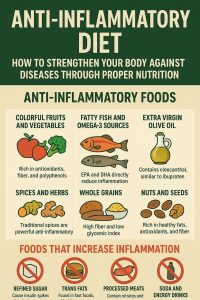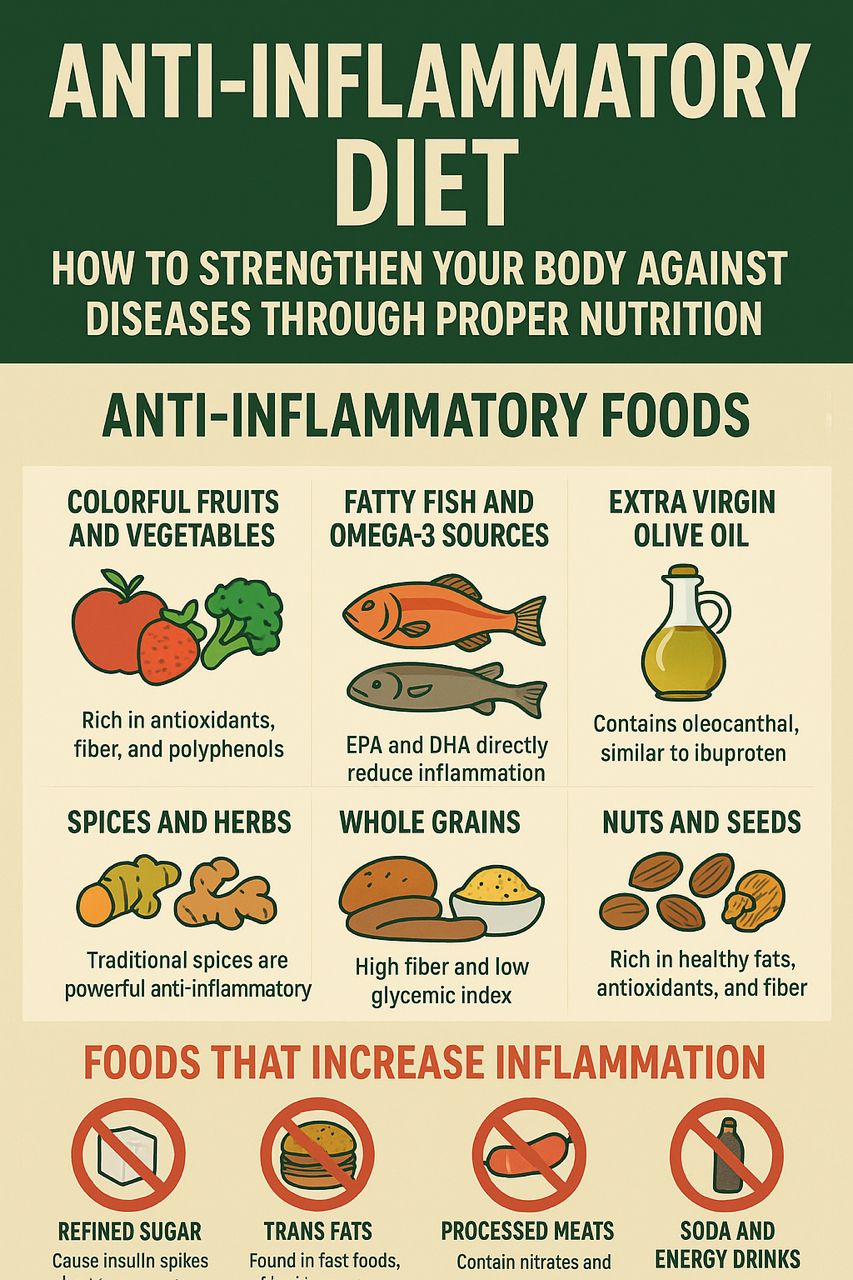
Anti-Inflammatory Diet: How to Strengthen Your Body Against Diseases Through Proper Nutrition
Abstract
Inflammation is a natural immune response that protects the body, but when it becomes chronic, it can contribute to serious health problems such as type 2 diabetes, heart disease, obesity, arthritis, Alzheimer’s disease, and even certain cancers. Research shows that proper nutrition is one of the most effective ways to control and reduce chronic inflammation. An anti-inflammatory diet, which emphasizes natural, plant-based, and minimally processed foods, plays a key role in improving overall health and preventing chronic diseases.
Introduction
Short-term (acute) inflammation is essential for fighting infections, healing wounds, and defending the body against harmful agents. However, in today’s world, due to stress, poor diet, sedentary lifestyle, obesity, and environmental pollution, many individuals experience persistent, hidden chronic inflammation.
This type of inflammation has no obvious symptoms but gradually damages the body’s tissues and increases the risk of various chronic diseases. One of the most effective ways to manage it is following an anti-inflammatory diet—a diet rich in antioxidants, healthy fats, and nutrients that protect the body.
Scientific Basis of the Anti-Inflammatory Diet
Anti-inflammatory foods support the body in three key ways:
1.Reducing the production of inflammatory cytokines
2.Lowering oxidative stress and free radicals
3.Supporting a healthy gut microbiome
Studies show that diets rich in vegetables, fruits, whole grains, lean proteins, and healthy fats significantly reduce chronic inflammation.
Foods with Anti-Inflammatory Properties
1. Colorful Fruits and Vegetables
Rich in antioxidants, fiber, and polyphenols.
Examples include:
•Berries (blueberries, raspberries, strawberries)
•Leafy greens (spinach, kale, beet greens)
•Pumpkin, carrots, colorful bell peppers
•Tomatoes
They help neutralize free radicals and lower inflammation.
2. Fatty Fish and Omega-3 Sources
EPA and DHA directly reduce inflammation.
Best sources:
•Salmon
•Sardines
•Tuna
•Mackerel
Plant-based alternatives: chia seeds, flaxseeds, walnuts, algae oil.
3. Extra Virgin Olive Oil
Contains oleocanthal, a compound with anti-inflammatory effects similar to ibuprofen.
1–2 tablespoons daily is beneficial.
4. Spices and Herbs
Traditional spices are powerful anti-inflammatory agents:
•Turmeric (curcumin)
•Ginger
•Cinnamon
•Thyme and rosemary
•Fresh garlic
Regular consumption in meals or as herbal teas is effective.
5. Whole Grains
High fiber and low glycemic index reduce blood sugar spikes and inflammation.
Best options:
•Oats
•Brown rice
•Whole wheat
•Quinoa
6. Nuts and Seeds
Rich in healthy fats, antioxidants, and fiber:
•Almonds
•Walnuts
•Pistachios
•Sunflower seeds, sesame, flaxseeds
A small handful per day is enough.
7. Legumes
Excellent plant-based protein with high fiber:
•Lentils
•Beans
•Chickpeas
A great substitute for high-fat meats.
Foods that Increase Inflammation (To Avoid)
❌ Refined sugar and sweets
Cause insulin spikes and oxidative stress.
❌ Trans fats
Found in fast foods, fried foods, pastries, and margarine.
❌ Processed meats
Sausage, salami, bacon—contain nitrates and inflammatory additives.
❌ Refined flour and white bread
❌ Sodas and energy drinks
Sample Daily Anti-Inflammatory Meal Plan
Breakfast:
Oatmeal + berries + walnuts + a pinch of cinnamon
Snack:
A fruit + almonds
Lunch:
Grilled salmon + brown rice + salad with olive oil
Afternoon snack:
Ginger tea + dates
Dinner:
Lentil and vegetable stew + cabbage salad
Long-Term Benefits of an Anti-Inflammatory Diet
Following this diet can lead to:
•Weight loss and improved cholesterol
•Lower blood pressure
•Better blood sugar control
•Reduced joint pain
•Improved brain function and memory
•Stronger immune system
•Lower risk of chronic diseases (heart disease, diabetes, cancers)
Conclusion
Chronic inflammation is a silent yet dangerous condition that threatens human health. Fortunately, one of the simplest and most effective ways to reduce it is adopting a healthier eating pattern. An anti-inflammatory diet—focused on natural, plant-based, minimally processed foods—can significantly strengthen the body against chronic diseases.
Overall, this diet is not just a nutritional choice but a healthy lifestyle that greatly improves long-term well-being.




